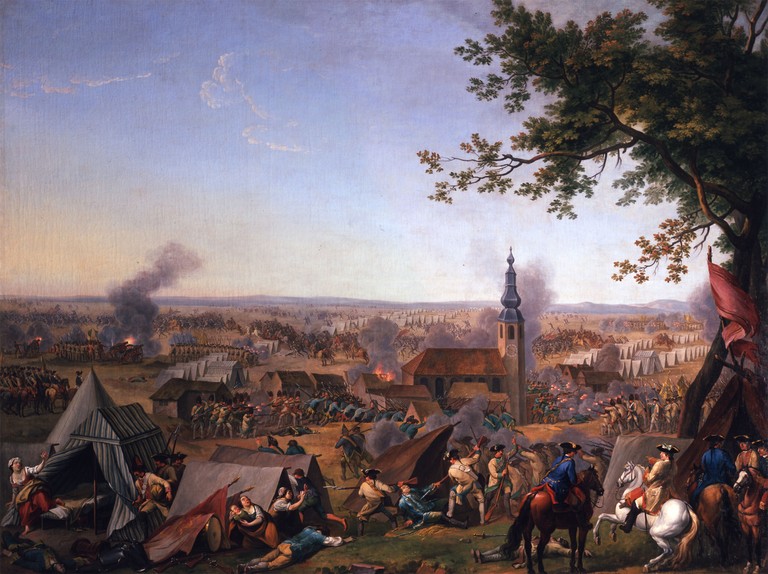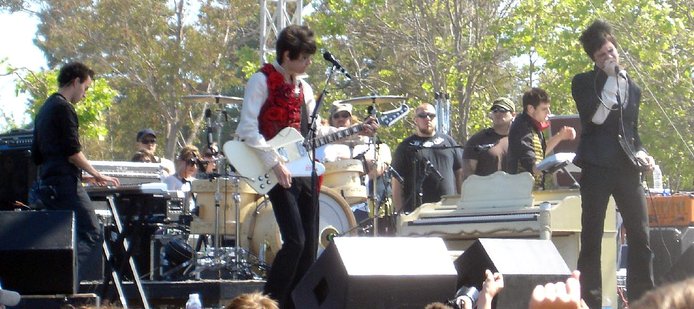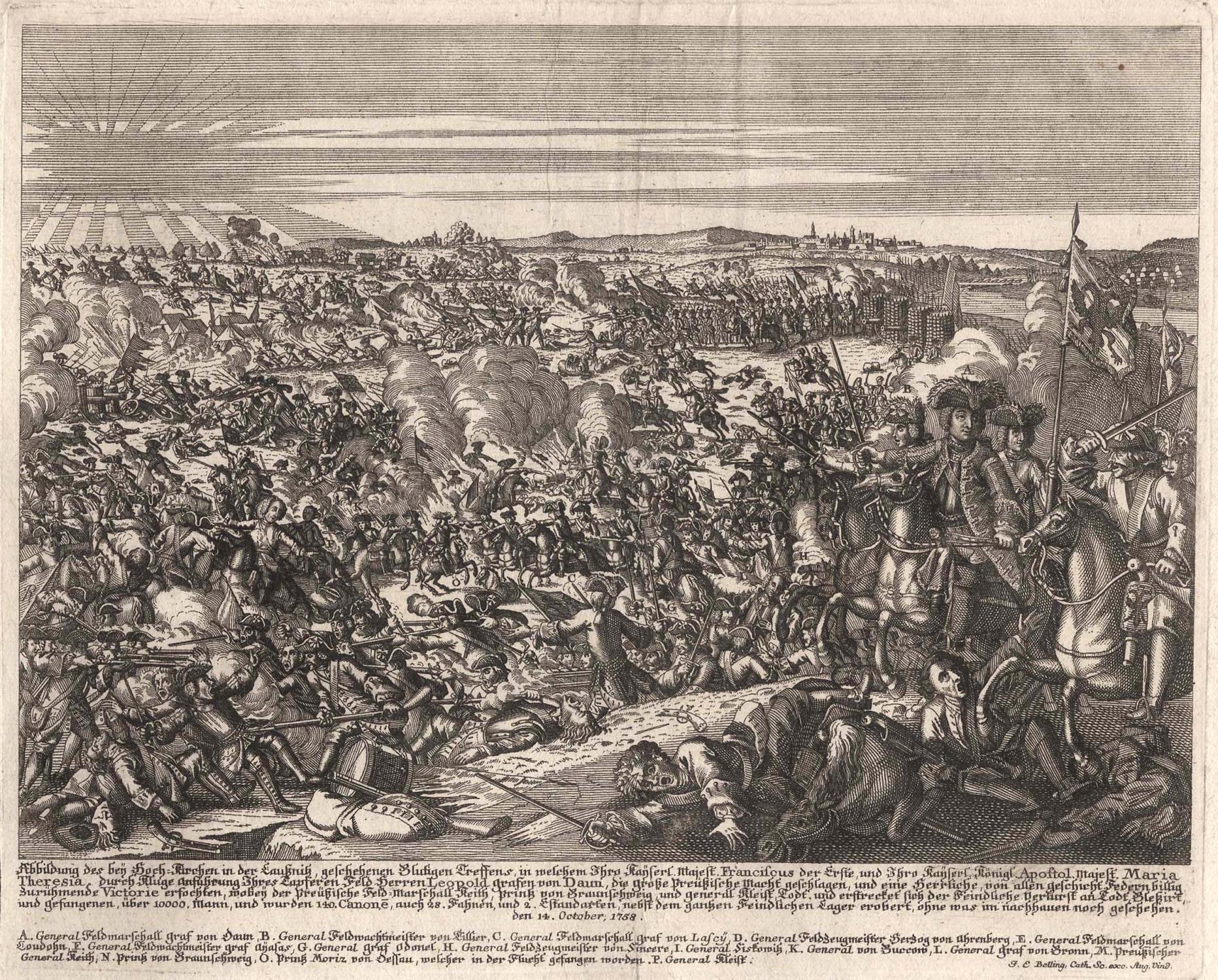|
Camisado
In military tactics, a camisado or camisade is a surprise attack occurring at night or at daybreak, when the enemy are supposed to be asleep. The term comes from Spanish ''camisa'' (shirt): when the Tercio had actions (skirmishes) of around fifty men attacking at night with minimum equipment, only sword and dagger (although some soldiers could carry arquebus or musket), and they were dressed only with a white shirt (thus the Spanish word :es:encamisada), in order to kill in silence as many enemies as possible while they were sleeping. This is reflected in the film '' Alatriste'', based on the main character of '' The Adventures of Captain Alatriste'' (), a series of novels written by Arturo Pérez-Reverte. Notable camisados * On 16 December 1332, Scots forces successfully led a surprise attacked in the early morning hours against King Edward Balliol and his supporters at the Battle of Annan. * On 9 October 1544, French forces under the Dauphin assaulted Boulogne by night, but ... [...More Info...] [...Related Items...] OR: [Wikipedia] [Google] [Baidu] |
Military Tactic
Military tactics encompasses the art of organizing and employing fighting forces on or near the battlefield. They involve the application of four battlefield functions which are closely related – kinetic or firepower, mobility, protection or security, and shock action. Tactics are a separate function from command and control and logistics. In contemporary military science, tactics are the lowest of three levels of warfighting, the higher levels being the strategic and operational levels. Throughout history, there has been a shifting balance between the four tactical functions, generally based on the application of military technology, which has led to one or more of the tactical functions being dominant for a period of time, usually accompanied by the dominance of an associated fighting arm deployed on the battlefield, such as infantry, artillery, cavalry or tanks. Tactical functions Kinetic or firepower Beginning with the use of melee and missile weapons such as clubs and s ... [...More Info...] [...Related Items...] OR: [Wikipedia] [Google] [Baidu] |
Leopold Josef Graf Daun
Count Leopold Joseph von Daun (german: Leopold Joseph Maria, Reichsgraf von und zu Daun; 24 September 17055 February 1766), later Prince of Thiano, was an Austrian field marshal of the Imperial Army in the War of the Austrian Succession and Seven Years' War. Early years Leopold Joseph Maria was born at Vienna, the son of Count Wirich Philipp von Daun (1669–1741). The Daun noble family originated from the Rhineland and derived its name from the ancestral seat at Daun south of the High Eifel range. He was intended for the church, but his natural inclination for the army, in which his father and grandfather had been distinguished generals, proved irresistible. In 1718 he served in the War of the Quadruple Alliance in Sicily, in his father's regiment. He had already risen to the rank of ''Oberst'' (Colonel) when he saw further active service in Italy and on the Rhine in the War of the Polish Succession (1734–35). He continued to add to his distinctions in the Turkish War of 1 ... [...More Info...] [...Related Items...] OR: [Wikipedia] [Google] [Baidu] |
Panic! At The Disco
Panic! at the Disco is the solo project of American musician Brendon Urie. It was originally a pop rock band from Las Vegas, Nevada, formed in 2004 by childhood friends Urie, Ryan Ross, Spencer Smith, and Brent Wilson. They recorded their first demos while they were in high school. Shortly after, the band recorded and released their debut studio album, ''A Fever You Can't Sweat Out'' (2005). Popularized by the second single, "I Write Sins Not Tragedies", the album was certified triple platinum in the US. In 2006, founding bassist Brent Wilson was fired from the band during an extensive world tour and subsequently replaced by Jon Walker. The band's second album, '' Pretty. Odd.'' (2008), was preceded by the single "Nine in the Afternoon". That album marked a significant departure from the sound of the band's debut. Ross and Walker, who favored the band's new direction, departed because Urie and Smith wanted to make further changes to the band's style. Ross and Walker subsequently ... [...More Info...] [...Related Items...] OR: [Wikipedia] [Google] [Baidu] |
A Fever You Can't Sweat Out
''A Fever You Can't Sweat Out'' is the debut studio album by American pop rock band Panic! at the Disco. Produced by Matt Squire, the album was released on September 27, 2005, through Decaydance and Fueled by Ramen. The group formed in Las Vegas in 2004 and began posting demos online, which caught the attention of Fall Out Boy bassist Pete Wentz. Wentz signed the group to his own imprint label, Decaydance, without them having ever performed live. It is the only album released during original bassist Brent Wilson's time in the band, but the exact nature of his involvement in the writing and recording process became a source of contention upon his dismissal from the group in mid-2006. The album was recorded on a small budget at SOMD! Studios in College Park, Maryland over several weeks in June 2005. The group had only graduated from high school one month before. With lyrics written by lead guitarist/backing vocalist Ryan Ross, the album is divided into halves stylistically; the first ... [...More Info...] [...Related Items...] OR: [Wikipedia] [Google] [Baidu] |
Battle Of Trenton
The Battle of Trenton was a small but pivotal American Revolutionary War battle on the morning of December 26, 1776, in Trenton, New Jersey. After General George Washington George Washington (February 22, 1732, 1799) was an American military officer, statesman, and Founding Father who served as the first president of the United States from 1789 to 1797. Appointed by the Continental Congress as commander of th ...'s George Washington's crossing of the Delaware River, crossing of the Delaware River north of Trenton the previous night, Washington led the main body of the Continental Army against Hessian (soldiers), Hessian auxiliaries garrisoned at Trenton. After a brief battle, almost two-thirds of the Hessian force were captured, with negligible losses to the Americans. The battle significantly boosted the Continental Army's waning morale, and inspired re-enlistments. The Continental Army had previously New York and New Jersey campaign, suffered several defeats in New Y ... [...More Info...] [...Related Items...] OR: [Wikipedia] [Google] [Baidu] |
Hessian (soldiers)
Hessians ( or ) were German soldiers who served as auxiliaries to the British Army during the American Revolutionary War, British Army during the American Revolutionary War. The term is an American synecdoche for all Germans in the American Revolution#Allies of Great Britain, Germans who fought on the British side, since 65% came from the German states of Landgraviate of Hesse-Kassel, Hesse-Kassel and Hesse-Hanau. Known for their discipline and martial prowess, around 30,000 Germans fought for the British during the war, comprising a quarter of British land forces. While regarded, both contemporaneously and Historiography, historiographically, as mercenaries, Hessians were legally distinguished as auxiliaries: whereas mercenaries served a foreign government of their own accord, auxiliaries were soldiers hired out to a foreign party by their own government, to which they remained in service. Auxiliaries were a major source of income for many small and relatively poor German states ... [...More Info...] [...Related Items...] OR: [Wikipedia] [Google] [Baidu] |
Continental Army
The Continental Army was the army of the United Colonies (the Thirteen Colonies) in the Revolutionary-era United States. It was formed by the Second Continental Congress after the outbreak of the American Revolutionary War, and was established by a resolution of Congress on June 14, 1775. The Continental Army was created to coordinate military efforts of the Colonies in their war for independence against the British, who sought to keep their American lands under control. General George Washington was the commander-in-chief of the army throughout the war. The Continental Army was supplemented by local militias and volunteer troops that were either loyal to individual states or otherwise independent. Most of the Continental Army was disbanded in 1783 after the Treaty of Paris formally ended the fighting. The 1st and 2nd Regiments of the Army went on to form what was to become the Legion of the United States in 1792. This became the foundation of what is now the United States ... [...More Info...] [...Related Items...] OR: [Wikipedia] [Google] [Baidu] |
George Washington
George Washington (February 22, 1732, 1799) was an American military officer, statesman, and Founding Father who served as the first president of the United States from 1789 to 1797. Appointed by the Continental Congress as commander of the Continental Army, Washington led the Patriot forces to victory in the American Revolutionary War and served as the president of the Constitutional Convention of 1787, which created the Constitution of the United States and the American federal government. Washington has been called the " Father of his Country" for his manifold leadership in the formative days of the country. Washington's first public office was serving as the official surveyor of Culpeper County, Virginia, from 1749 to 1750. Subsequently, he received his first military training (as well as a command with the Virginia Regiment) during the French and Indian War. He was later elected to the Virginia House of Burgesses and was named a delegate to the Continental Congress ... [...More Info...] [...Related Items...] OR: [Wikipedia] [Google] [Baidu] |
Battle Of Hochkirch
The Battle of Hochkirch took place on 14 October 1758, during the Third Silesian War (part of the Seven Years' War). After several weeks of maneuvering for position, an Austrian army of 80,000 commanded by Lieutenant Field Marshal Leopold Josef Graf Daun surprised the Prussian army of 30,000–36,000 commanded by Frederick the Great. The Austrian army overwhelmed the Prussians and forced a general retreat. The battle took place in and around the village of Hochkirch, east of Bautzen, Saxony. Historians generally consider the battle as among Frederick's greatest blunders. Contrary to the advice of his subordinates, he refused to believe that the typically cautious Austrian commander Leopold von Daun would bring his troops into battle. The Austrian force ambushed his army in a pre-dawn attack. Over 30% of Frederick's army was defeated; five generals were killed and he lost his artillery park and a vast quantity of supplies. Although Daun had scored a complete surprise, his atte ... [...More Info...] [...Related Items...] OR: [Wikipedia] [Google] [Baidu] |
Frederick The Great
Frederick II (german: Friedrich II.; 24 January 171217 August 1786) was King in Prussia from 1740 until 1772, and King of Prussia from 1772 until his death in 1786. His most significant accomplishments include his military successes in the Silesian wars, his re-organisation of the Prussian Army, the First Partition of Poland, and his patronage of the arts and the Enlightenment. Frederick was the last Hohenzollern monarch titled King in Prussia, declaring himself King of Prussia after annexing Polish Prussia from the Polish–Lithuanian Commonwealth in 1772. Prussia greatly increased its territories and became a major military power in Europe under his rule. He became known as Frederick the Great (german: links=no, Friedrich der Große) and was nicknamed "Old Fritz" (german: links=no, "Der Alte Fritz"). In his youth, Frederick was more interested in music and philosophy than in the art of war, which led to clashes with his authoritarian father, Frederick William I of Prussia. ... [...More Info...] [...Related Items...] OR: [Wikipedia] [Google] [Baidu] |
Boulogne-sur-Mer
Boulogne-sur-Mer (; pcd, Boulonne-su-Mér; nl, Bonen; la, Gesoriacum or ''Bononia''), often called just Boulogne (, ), is a coastal city in Northern France. It is a sub-prefecture of the department of Pas-de-Calais. Boulogne lies on the Côte d'Opale, a touristic stretch of French coast on the English Channel between Calais and Normandy, and the most visited location in the region after the Lille conurbation. Boulogne is its department's second-largest city after Calais, and the 183rd-largest in France.Téléchargement du fichier d'ensemble des populations légales en 2017 [...More Info...] [...Related Items...] OR: [Wikipedia] [Google] [Baidu] |
Tercio
A ''tercio'' (; Spanish for " third") was a military unit of the Spanish Army during the reign of the Spanish Habsburgs in the early modern period. The tercios were renowned for the effectiveness of their battlefield formations, forming the elite military units of the Spanish Monarchy. They were the essential pieces of the powerful land forces of the Spanish Empire, sometimes also fighting with the navy. The Spanish tercios were a crucial step in the formation of modern European armies, understood as made up of professional volunteers, instead of levies raised for a campaign or hired mercenaries typically used in other European countries of the time. The tercios' internal administrative organization, and their battlefield formations and tactics, grew out of the innovations of Gonzalo Fernández de Córdoba during the conquest of Granada and the Italian Wars in the 1490s and 1500s. The tercios marked a rebirth of battlefield infantry comparable to the Macedonian phalanxes and ... [...More Info...] [...Related Items...] OR: [Wikipedia] [Google] [Baidu] |








